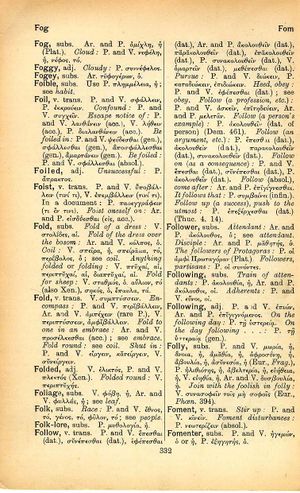following: Difference between revisions
From LSJ
Ὑπὲρ σεαυτοῦ μὴ φράσῃς ἐγκώμιον → Noli ipse laudis facere tibi praeconium → Dich selbst bedenke nicht mit einem Lobgedicht
m (Woodhouse1 replacement) |
mNo edit summary |
||
| Line 11: | Line 11: | ||
[[prose|P.]] and [[verse|V.]] [[ἐπιών]], [[Aristophanes|Ar.]] and [[prose|P.]] [[ἐπιγιγνόμενος]]. | [[prose|P.]] and [[verse|V.]] [[ἐπιών]], [[Aristophanes|Ar.]] and [[prose|P.]] [[ἐπιγιγνόμενος]]. | ||
[[on the | [[on the following day]]: [[prose|P.]] [[τῇ ὑστεραίᾳ]]. | ||
[[on the day following ..]].: [[prose|P.]] [[τῇ ὑστεραίᾳ]] (gen.). | [[on the day following ..]].: [[prose|P.]] [[τῇ ὑστεραίᾳ]] (gen.). | ||
}} | }} | ||
Revision as of 16:30, 1 June 2020
English > Greek (Woodhouse)
substantive
train of attendants: P. ἀκολουθία, ἡ, Ar. and P. ἀκόλουθοι, οἱ.
adherents: P. and V. εὔνοι, οἱ.
adjective
P. and V. ἐπιών, Ar. and P. ἐπιγιγνόμενος.
on the following day: P. τῇ ὑστεραίᾳ.
on the day following ...: P. τῇ ὑστεραίᾳ (gen.).

